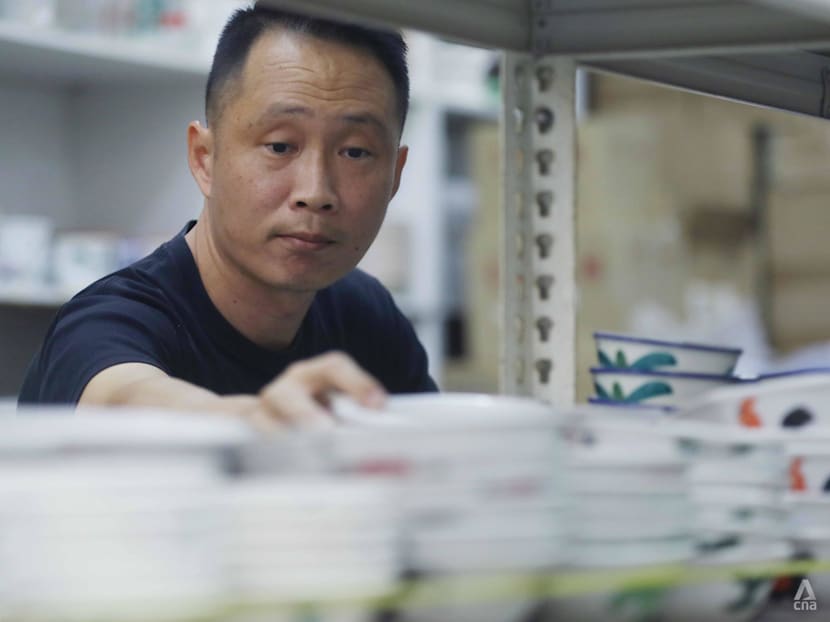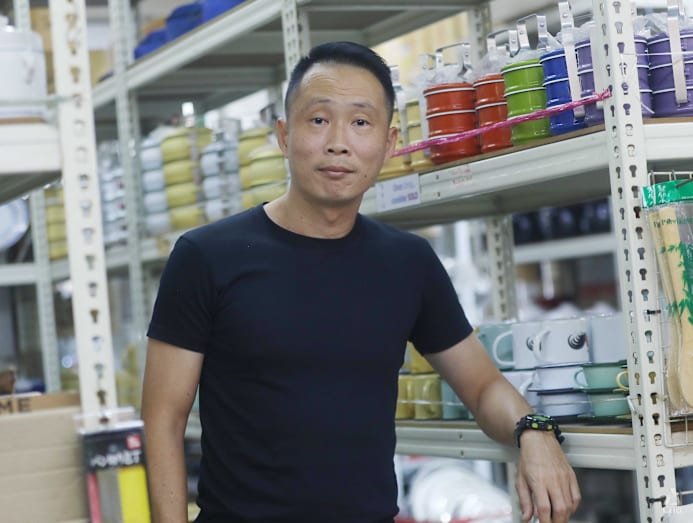Built from sweat, stalled by succession: What happens when Singapore's SMEs have no one to take over the helm
Many SME founders built their businesses through sheer grit and long hours, but few have planned for what happens next. Experts say a lack of succession planning now poses one of the biggest risks to Singapore's business backbone.

Mr Kenneth Ng, 46, faces uncertainty over who will succeed him in his family-run porcelain business in Chinatown, as his children are still young and managing an SME is challenging. (Photo: Â鶹/Alyssa Tan)

This audio is generated by an AI tool.
When Mr Gavin Woo, now 57, started his business nearly three decades ago, succession was the last thing on his mind. His attention was on growing his office furniture company, clocking 16-hour workdays to keep it afloat and moving forward.
Like many small- and medium-sized enterprise (SME) founders, Mr Woo assumed he would simply keep going – there was so much to do to keep the business, called Office Planner, thriving, and retirement felt distant.
Then in 2017, his doctor detected a brain aneurysm, and he underwent an operation to insert a stent. He spent three days in the intensive care unit and returned to work within a week.
"As I was being rolled into surgery, I kept thinking: What's going to happen to my company and my staff if I don't come out of this alive?" he recalled.
When he returned to the office, he knew what he had to do and began succession planning, identifying a suitable successor to lead the company. He eventually chose his long-standing sales manager, Ms Adele Ang, now 38.
In 2021, he promoted her to a leadership role, gradually handing over operational control and giving her shares, eventually making her an equal shareholder.

Today, Mr Woo focuses on building networks, fostering collaborations and strengthening community ties, while Ms Ang, now the sales director, leads the company's sales strategy and growth.
"On succession, I consider myself very lucky. Most people only start looking for someone when it's too late. And many times, they aren't able to find anyone suitable," he said.
Across Singapore, many business owners like Mr Woo have built their life's work from scratch – but few have concrete plans for what comes next when they retire.
Experts told Â鶹 TODAY that the bigger challenge for most SMEs isn't money, but finding capable successors. Without them, companies face the risk of decline when founders retire, fall ill or die.
HSBC's 2025 Harmony Through Succession Planning report found that 81 per cent of Singapore entrepreneurs say they would like to keep their businesses in the family, yet more than half (55 per cent) have no succession plan in place.
And while 74 per cent believe their children are capable of taking over, more than half (52 per cent) worry that their children won't want to.
"Very often, people don't plan succession until they get a health scare, like a heart attack or cancer," said National University of Singapore (NUS) Business School's Associate Professor Yupana Wiwattanakantang, whose research focuses on entrepreneurial finance, corporate finance and governance, as well as succession planning of family enterprises.
"Many Singapore SMEs are family-owned and have ageing founders. Even at hawker and small-shop levels, you can see older owners with no clear successor."
WHAT'S AT RISK WITHOUT SUCCESSION PLANNING
The Association of Small and Medium Enterprises (ASME) told Â鶹 TODAY that succession is "one of the most widespread yet least prepared-for challenges" facing SMEs, which make up 99 per cent of all businesses in Singapore and employ about 70 per cent of the workforce.
Its spokesperson Mr John Ji said that since SMEs account for nearly 80 per cent of Singapore's private-sector activity, such widespread succession gaps would have a ripple effect on jobs, suppliers and entire industries.
"The deeper risks lie in the loss of intangible capital, as well as the accumulated trust, tacit knowledge and relationships painstakingly built by founders," said Mr Ji, who is also founder of H3 Geospatial Technologies.
"This kind of capital is difficult to measure, but once it disappears, it takes years to rebuild."
While new businesses emerge in Singapore's landscape, experts said this doesn't fully solve the succession challenge among older SMEs. There is no data on how many firms close because of succession issues, but the concern remains that experience and capabilities may be lost when founder-led firms wind down.
ASME's Mr Ji said that Singapore's vibrant startup scene and new enterprises cannot fully replace what is lost when an established SME folds.
"New enterprises bring fresh ideas, but older family businesses carry irreplaceable continuity such as long-term customer trust, supplier relationships and industry know-how built over decades," Mr Ji said.
Protecting the continuity of existing SMEs is equally vital to safeguarding Singapore's business backbone, he added.
Without a clear plan, delayed owner retirement reduces business productivity, increasing the likelihood of distress sales and closures, added Dr Julien Salanave, professor of practice in entrepreneurship and innovation at ESSEC Business School, Asia-Pacific.
"Given SMEs' massive contribution to total employment in Singapore, the macro risk is real. Unresolved succession can also amplify labour-market and competitiveness pressures as ageing firms struggle to adapt."
Dr Salanave said international evidence shows that raising SME productivity to top-quartile levels could lift the gross domestic product (GDP) in advanced economies by about 5 per cent. If succession gaps stall renewal and scaling, he added, Singapore risks missing out on such gains.
The vulnerabilities are most acute in food and beverage, traditional trades, construction, logistics and light manufacturing – sectors where much of the value lies in tacit know-how, long hours, regulated licences and relationship-based contracts that don't transfer easily to outsiders, he noted.
WHY SUCCESSION IS SO HARD
While succession sounds simple in theory – train someone new and hand over the reins – in reality, it's one of the hardest transitions a business can face, experts said.
Assoc Prof Yupana of NUS Business School said that in many cases, SME bosses assume they will "keep going" indefinitely and since "nothing bad has happened to me" yet, there's no need to focus on this issue now.
She added that, given that succession is also a long and complicated process, many SME founders put it on the back burner and instead prioritise their day-to-day operations.
"Every day, they're solving problems, so succession gets pushed to 'later, later, later'. But people don't realise it should be a priority today. It's like exercise. You think it's not important, you say you have no time, but it's actually very important," said Assoc Prof Yupana.
This rings true for fifth-generation florist Ms Gracelyn Lin, whose family members at Sing See Soon Floral & Landscape saw retirement planning as a "luxury thought" as their mindset was rooted in "survival", not strategy.
Founded in 1879 by her great-great-grandparents, the business was rebuilt more than once. Both her great-grandmother and grandmother were widowed young and had to grow the company from scratch just to put food on the table, said Ms Lin, who is in her 40s.
By the time the business reached its fifth generation, roles were still informal.
"There was no CFO (chief financial officer) or CEO, and everyone did everything. Governance was the hardest part. We had to professionalise before we could even think about succession," said Ms Lin, who took over the family business in the mid-2000s as its chief executive officer.

HARD TO LET GO
Experts said that succession, especially in a family business, is not just a management decision, but also a deeply emotional process involving familial expectations, identity and relationships.
While not every SME is a family business, most started out that way, with ownership and management closely intertwined.
ASME's Mr Ji said founders are highly hands-on with the business and rarely step back to prepare someone else to take over.
"Many view the business as their life's work, and letting go is an emotionally challenging task."
Mr Ji also said that professional managers or external successors may bring operational expertise, but they lack the decades of loyalty from employees, customers and suppliers that are attached to the founder.
"Owners worry that an 'outsider' may not uphold the same values. In addition, culturally, passing the business down through the bloodline still carries significant weight."
For Ms Lin's family, she said that the earlier generations had to "run the business for the family" to survive, but as the company scales, she believes they now need to "run the business for the business".
Keeping to the former mindset proved challenging as well, as Ms Lin soon realised, upon taking over the reins, that the old way blurred boundaries and created internal resistance to reform.
Still, Ms Lin values the family-first culture that kept long-time staff with them for decades. The challenge now, she added, is to honour those roots while preparing for a more professionalised succession, especially as older family members age and no sixth-generation successor has emerged.
"We'll need to engage 'strangers', like non-family leaders or buyers, for succession, but that's hard for the older generation to accept."
DIFFERENT AMBITIONS FOR THE NEXT GENERATION
While parents who founded businesses hope to , younger Singaporeans prefer the opportunity to pursue careers that offer stability and fulfilment elsewhere.
The difference in priorities is clear in Mr Mitchell Yap's case. The 25-year-old’s family runs an industrial-automation distribution business that has been around for over two decades and is co-owned by several relatives and a long-time family friend.
Mr Yap, who isn't a trained engineer like his father, said he has no plans to join the family business and is instead building his own tech start-up.
"(The family business) is something I can fall back on if things go wrong. But it's not my first choice. I'd rather build my own path," he said.
For some founders, the hesitation runs both ways – parents no longer insist their children take over, and children no longer feel obliged to do so.
Mr Kenneth Ng, 46, the third-generation owner of Hai Seng Porcelain in Chinatown, said his eldest child is 17 and, at this stage, he does not want her to take over the family homeware business as managing an SME is challenging.
"Bigger companies have better systems and more talent. For young people, that's appealing because they don't have to worry about bank loans, rent or operations. They just draw a salary every month."

For now, Mr Ng is focused on keeping the business afloat for at least another 14 to 15 years, until he retires at 60, while giving his three children the freedom to pursue their own paths.
He added that while a family member taking over would be ideal, he's open to an outsider doing so, provided they understand Singapore's history and the stories behind the products, so they would be able to win over customers.
TALENT SCARCITY
Business owners and academics told Â鶹 TODAY they are noticing the same challenge: Younger generations are often choosing careers outside the family business, attracted to multinational corporations (MNCs) and higher-paying fields like consulting and finance, which offer brand-name recognition and clear career progression.
This leaves many SMEs struggling to attract and retain professional managers, even when founders are willing to hire them.
"For decades, Singapore's SMEs have had no real succession solution. Grants are not what they need. They need leadership to take over their business and steward it for the next generation," said Mr Dennis Chua, founder and CEO of Timah Partners, which acquires SMEs whose owners are ready to retire but have no succession plan.
The company, established this year, mainly acquires businesses valued at between S$10 million and S$50 million with annual operating profits of S$2 million to S$10 million, and then holds and operates them for the long term – installing a trained CEO from its succession programme to grow the business rather than restructure or flip it.
Mr Chua said that most SMEs just simply cannot find talent to become managers. In one case, Mr Chua reviewed a company's accounts and found that the highest-paid staff below the family members earned about S$6,500 a month, far less than what a manager capable of running the business or becoming CEO would expect.
It's not that owners aren't willing to pay more – they would offer S$15,000 to S$20,000 for the right person, but they struggle to find candidates of that calibre, he said.
"It's natural for well-educated students to look mainly at MNCs for jobs. That's a common outcome of a strong education system. The issue is the lack of clear career pathways for talented graduates."
He added that in countries such as the United States, India and South Korea, large firms or investment groups create programmes to channel graduates into essential but less glamorous businesses, a route that is largely missing in Singapore.
HOW TO BRIDGE THE SUCCESSION GAP
Experts told Â鶹 TODAY Singapore needs to normalise succession planning by integrating it into the business lifecycle, rather than treating it as a last-minute crisis plan.
Assoc Prof Yupana of NUS Business School said the government and institutions can play a stronger role in enabling smoother transitions.
"Business school curricula tend to focus on non-family, MNC-style models, so SME leaders rarely get trained in family succession. On top of that, there's a lack of subsidised, SME-specific succession courses," she said.
"While high net worth families have access to private banking or engage consultants, most SME owners, whose wealth is tied up in the business itself, don't seek succession advice. So many end up without any professional guidance on how to plan a transition."
Beyond education, she said Singapore's ecosystem must better support the continuity of viable firms – for example, by fostering an active SME mergers-and-acquisitions market to enable transitions instead of closures, and offering targeted incentives to lower the cost of hiring outside professionals or structuring inter-generational transfers.
Assoc Prof Yupana added that these measures should work hand in hand with governance and advisory support to help founders make informed choices about whether to keep management in the family or hand over to professionals.
ASME's Mr Ji said that succession works best when SMEs have neutral platforms to start tough conversations and offer clear guidance on governance. Neutral third parties provide an unbiased space for families to discuss leadership, roles and succession without pressure or conflict, helping pave the way for structured planning.
As a small step towards addressing succession in SMEs, Mr Chua of Timah Partners started the CEO Succession Programme this year. It was made possible after Timah Partners secured US$50 million in external funding in June, backed by the founders of major US-based holding companies, including TransDigm, Danaher, and 3G Capital.
Singaporeans from leading Master of Business Administration (MBA) programmes in the United States and the United Kingdom, venture-backed startups, as well as public sector, military, finance, or consulting backgrounds, are recruited for the programme and immersed in the realities of running SMEs.

They first spend time at the holding company learning the basics of how SMEs are financed and then shadow the CEO for about a year to understand day-to-day operations.
In the final stage, they take on a CEO-designate role with a 180-day plan and close board oversight before eventually taking over the business.
"It's like a hands-on MBA," said Mr Chua. "The recruits remain employees of Timah Partners, and over their careers, we expect them to run multiple businesses, rotating across companies within our portfolio."
The vision for the programme, he added, is to connect strong SMEs with talented young professionals, making SME management a sought-after career. "In 10 to 15 years, we want talent to think: 'I want to be an SME CEO.'"
For some, however, the best successor may already be inside the company.
For Mr Woo, the founder of Office Planner, grooming his long-time manager into an equal shareholder showed that with trust, mentorship and clear governance, SMEs can achieve continuity without needing external intervention or talent programmes.
His advice to other founders: Start succession planning early and be open to the idea that others will preserve your legacy and maybe even take your company to greater heights.
"And ask yourself: If something happens to you tomorrow, and you're the sole business owner, what's going to happen to your staff?"











